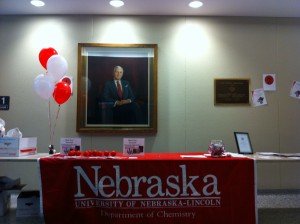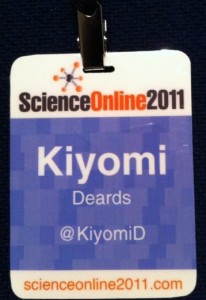
Overview:
After a whirlwind American Library Associations MidWinter and a couple vacation days with my family in California I headed across the United States to North Carolina for Science Online 2011, held in Research Triangle Park. For those of you not familiar with Science Online it bills itself as an un-conference, a place where the presenters are there to facilitate a discussion, but the audience is the real source information.
I’ve been to a few un-conferences and know that you’re probably thinking about how lots of un-conference sessions fail to deliver, but I have to say that all the un-conference discussions at #scio11 that I attended had extremely engaged presenters and audience members. ?Instead of wishing the session would just end at a certain point, sessions left you wishing that you had an extra hour or two to continue your discussion.
Un-conferences are often thought of as less professional, less rigorous, but #scio11 blows those preconceptions out of the water. Unlike a traditional conference where you may be speaking with your peers in a niche area attendees at #scio11 came from many backgrounds, just to give you a small idea of the types of people I met: industry researchers, university faculty, high school teachers & students, journal editors, journalists, programmers, and science bloggers, to see more check out the #scio11 attendee list. These attendees were not a passive audience but an active and vital force which provided insight and caused discussions to turn in exciting, if unexpected, directions.
In the interest of full disclosure, and so you don’t think I’m sugar coating things, there was one snafu during the workshops on Friday when we apparently overloaded the server because the Internet connections slowed to a crawl when a room full of people tried to load and use Prezi at the same time. As far as technical problems go I didn’t consider it that big of a deal, but I suspect with the proposed change in venue next year that it won’t be a problem in the future.
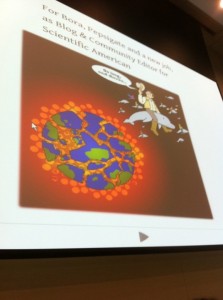
A great opening:
…by Bora & Anton (the main organizers of #scio11) followed by one of the most interesting opening speeches I’ve ever attended by Robert Krulwich. What was unique about Robert Krulwich’s speech was that instead of using slides he used audio clips to illustrate his talk and then surprised us with a video clip at the end. His talk has me seriously considering if that might not be an effective way to present in the future. Clearly a master of audio timing I’d highly recommend that you listen to Krulwich’s keynote speech!
SciO11 Video: Bora & Anton Opening (Part 1)
SciO11 Video: Bora & Anton Opening (Part 2)
SciO11 Video: Robert Krulwich Keynote (Part 1)
SciO11 Video: Robert Krulwich Keynote (Part 2)
SciO11 Video: Robert Krulwich Keynote (Part 3)
Biomanufacturing:
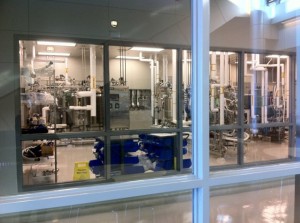
Thanks to Russ Campbell of the Burroughs Wellcome Trust without whom we would not have been able to tour the Golden LEAF Biomanufacturing Training & Education Center. I have to admit that initially I signed up for this tour because it was an area I needed to learn more about for work, however, thanks to Winnell Newman who provided the tour, Walter, Rhianna, and Russ I not only learned a lot about the biomanufacturing industry and training, but had a fun time while doing so.
Completely blown away:
Luckily I sat with Stacy Baker and some of the students from her class blog, Extreme Biology at the group dinners Friday night. Not only was I impressed with the maturity of Stacy’s students, but also with their intelligence and depth of thought. ?I honestly think Stacy’s students were the smartest people in the room and I had a great time chatting with them and finding out about their hopes and dreams for the future. Watch out, Stacy’s students are going to change the world, they’re already doing it!
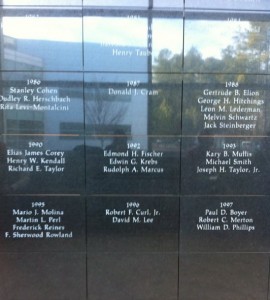
Discussions:
Active participation was the key to the #Scio11 experience. I learned more about advances and issues in science, data curation, and science communication from the free-range discussion sessions and the individual conversations in the hall than I could ever have learned digging around the Internet.
If you’re a science librarian, scientist, science enthusiast, or journalist and want to know what the hot issues are, what people really want, #Scio12 will be the place to be next January. I’m really grateful to @2020Science for making me aware of the convention, it may have been the most useful information I’ve been passed all year.
Special Swag & Other Goodness:
1) The Beautiful Blue Crab DVD (Link to NCSU YouTube chanel versions)
2) Poisoner?s Handbook
3) Science of Kissing Promo Chapstick
4) Annoyatron
5) #ihuggedbora
6) Endangered Species Condoms
7) Canopy Meg <= This woman is my new science hero!
#1 Lesson Learned: Show up & participate to succeed!
Have lots of fun & make new friends & meet future collaborators at the same time! :-)
Remember it’s never too early to plan for next year so put #Scio12 on your calendar. I’m assured that the venue will be bigger next year, but I would register ASAP since #Scio11 sold out in 45 minutes!
Hope to see you there!

